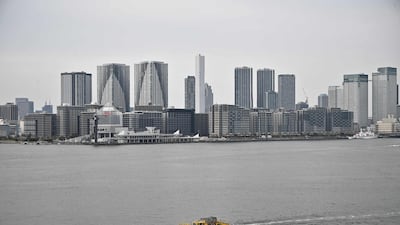As they battle Covid-19, countries across the world have rushed to put together stimulus packages to shield their economies from the pandemic that has ravaged the global economy.
Still recovering from the 2008 global financial crisis, governments and central banks sprung to action and deployed every tool at their disposal to prevent a credit freeze that would bring all economies to a virtual halt.
Trillion of dollars have so far been ploughed into the global economy by governments and institutions, dwarfing measures taken during the financial crisis.
Multilateral lenders including the International Monetary Fund and the World Bank have opened up their coffers, extending billions of dollars in aid and soft loans to help developing countries deal with the outbreak. Yet the UN is calling for at least $2.5 trillion (Dh9.18bn) more from the G20 countries to help their poorer counterparts around the world.
The G20 on March 26 announced an injection of more than $5tn into the global economy to limit the impact on labour markets and to support smaller businesses. The group pledged “do whatever it takes” to tackle the pandemic in a meeting chaired by King Salman of Saudi Arabia, which has the G20 rotating presidency.
In the US, the Federal Reserve cut the key interest rate in two emergency meetings in March and launched a $700 billion programme to buy assets. The US central bank also committed to open-ended asset buying –quantitative easing, as the monetary tool is known – to purchase corporate and municipal government bonds.
In tandem with the Fed, President Donald Trump approved a $2.2tn rescue package, the largest stimulus in US history, dwarfing the nearly $800bn package in the Barack Obama era that was passed five months after the 2008 financial crash. US lawmakers are now considering additional stimulus packages that will most certainly increase the size of the existing relief.
In the eurozone, European Central Bank President Christine Lagarde followed in her predecessor's path of doing "whatever it takes" to shore up the bloc's economies. The ECB increased its bond-purchasing programme by €750bn (Dh3tn) to about €1.1tn this year. It also removed the cap on the limit of bonds it can buy from any single country within the European bloc and suspended limits on borrowing by EU governments.
Major European economies including Germany, France, Italy and Spain have also rolled out their separate packages to support businesses and financial markets.
Germany’s package, worth about €750bn, includes €100bn for an economic stability fund, another €100bn for loans to the coronavirus-hit businesses and €400bn in loan guarantees for corporate debt at risk of defaulting. France put forward a €45bn package for workers as Paris guaranteed up to €300bn of corporate borrowing. Italy set out emergency measures worth €25bn, while Spain rolled out a €200bn package.
The UK which left the EU at the end of January, barely had time to switch gears from Brexit to fighting the coronavirus. The Bank of England cut the interest rate twice pushing it to a record low of 0.10 per cent. On the fiscal side, the government rolled out a £30bn (Dh135.8bn) economic package and a £330bn loan guarantee programme for businesses. The government is ready co-pay up to 80 per cent of wages of up to a maximum of £2,500 a month if businesses opt to send their staff on leave.
In Asia, Japan's government put forward a $990bn stimulus package equivalent to about 20 per cent of the country's GDP. It will include cash handouts for households and small businesses and offers businesses deferrals on tax and social service costs.
In Canada, the central bank cut rates three times. The country initially announced C$50bn (Dh130bn) insured mortgage purchase programme, which has now been boosted to C$150bn. The government will pay 75 per cent of workers’ wages. It has also extended a tax deferral scheme.
The Reserve Bank of Australia also cut its benchmark rate twice. It announced a A$90bn (Dh203bn) funding facility to banks, the buying of A$15bn residential mortgage-backed securities and A$715 million in aid for aviation sector. On the fiscal side, Canberra also rolled out an A$66.1bn programme for welfare payments and A$130bn in wage subsidies.
In China, the world’s second biggest economy, the central bank made the largest cut in its five years to its seven-day reverse repo rate to 2.20 per cent. The People’s Bank of China earlier introduced several liquidity injection measures at the peak of the coronavirus in the country, including cutting the amount of cash that banks must hold as reserves and introduced easier funding measures for smaller businesses.
Like other central banks around the world, the Reserve Bank of India has also cut its benchmark repo rate on March 27, a day after New Delhi rolled out a 1.7tn rupee stimulus (Dh82.6bn).
Nations in the Middle East are in lock step with Asia and more developed economies in the West.
Among the hydrocarbon-rich states in the GCC, which account for about a third of the world’s proven oil reserves, the Central Bank of the UAE was the first to rollout a Dh100bn economic stimulus, which it increased to Dh256bn. The regulator reduced reserve restrictions on bank deposits and massively expanded its Targeted Economic Support Scheme. In parallel, the UAE government pushed out a Dh26bn in fiscal stimulus.
Saudi Arabia pledged to cover 60 per cent of worker salaries up to 9,000 Saudi riyals (Dh 8,787) per month in private sector industries hit by the coronavirus pandemic for the next three months. This is in addition to the government’s 70bn riyal package to support the corporate sector and a 50bn riyal programme for banks and financial institutions.
Kuwait's central bank also announced a stimulus package on April 2 to support smaller businesses as it reduced liquidity and capital adequacy requirements for banks and cut risk weighting for SMEs. The package has increased banks' lending capacity by 5 billion dinars (Dh58bn).


